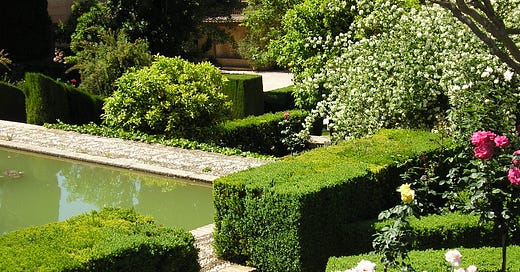Footnotes to a Conversation, July 25, 2022
“I value my garden more for being full of blackbirds than cherries, and very frankly give them fruit for their songs.” (Joseph Addison)
Good morning! Victoria is finally entering a week of hot summer weather. I know some of you have already experienced far too much heat, but it’s been a cool spring and summer in Victoria and I’m looking forward to the change.
Midges, Woolgathering, Giants & Old Maids
I picked up 7 books at the library this past week (I know, crazy, but it’s my way of compensating for not travelling at the moment). Four of them are about gardens so I’ve made a good start on my theme of the month.
Garden Physic is a book of poems by Sylvia Legris. Here are two samples displaying very different moods:
“Midges and tetchiness. A constantly muddy mood.” (Oh Darling,)
“The wide sweep of today. Books, flowers, and poetry. Woolgathering and trees.” (My My My,)
Pleasures of the Garden: A Literary Anthology selected by Christina Hardyment is a collection of historical writings about gardens. I started with the section on Garden Design and was delighted by Alexander Pope’s rant about topiary where he proposes the following topiary options:
“A pair of giants, stunted, to be sold cheap … An old maid of honour in wormwood … Divers eminent modern poets in bays, somewhat blighted, to be disposed of a pennyworth … A quick-set hog shot up into a porcupine, by being forgot a week in rainy weather.”
Fantasy & Magic
I was already planning to spend a month focussing on magic in all manner of shapes, forms, and sizes so I was pleased to see a review of 21st century fantasy novels, some of which appear to be a perfect fit. The author writes that while past fantasy fiction has been strongly influenced by European culture and myths, that is changing as
“writers of colour and writers from indigenous cultures use magical narratives to depict experiences and express viewpoints difficult to convey within the constraints of realism. One of the effects of fantasy is the way it forces us to consider the categories of the real, the possible and the ordinary – all the norms that fantasy violates. And, in particular, the new fantasy reveals how culture-bound those norms are.” [The Guardian]
Architecture in Miniature
Victoria has a plethora of little free libraries and you never know what unexpected hidden treasures they may contain. I found a book this week by Margaret Drabble about jigsaw puzzles! But the little libraries are sometimes treasures in and of themselves as they swing from a tree, are housed in a recycled filing cabinet, or are exact replicas of the home in front of which they sit. [CHEK News]
Tamales, Polenta & Mush
One of my weekly purchases at the Esquimalt Farmers’ Market is tamales, so I was intrigued when I came across 4 articles with recipes and background on cornmeal. Around the World in Cornmeal [Whetstone] describes the history and reach of cornmeal:
“Corn, cornmeal and cornmeal mush came from the Indigenous people of Mesoamerica, who called it maize. For them, it was both sacred food and daily sustenance. The Mesoamericans were growing, drying and grinding corn for millennia. Then Columbus showed up. He brought corn back to Europe in the 16th century, and we were off to the races … Once dried, corn keeps indefinitely. Ground into meal, then made into porridge, it morphs into something warming, versatile, filling and affordable. Mamaliga became the country’s [Romania] mainstay and point of pride. In Romanian, mamaliga means food of gold.”
If that description has made you hungry, here are recipes for blueberry cornmeal pudding [The Guardian] as well as cake, fried polenta, pizza, quiche, and ragu. [The Guardian]
Footnotes to a Conversation is a weekly Monday feature covering an assortment of topics that I’ve come across in the preceding week – books, art, travel, food, and whatever else strikes my fancy. I also post occasional articles on other dates, including frequent book reviews and travel tales.
If you share my love of nature, check out EcoFriendly West, an online publication encouraging environmental initiatives in Western Canada, and Nature Companion, a free nature app for Canada’s four western provinces.




